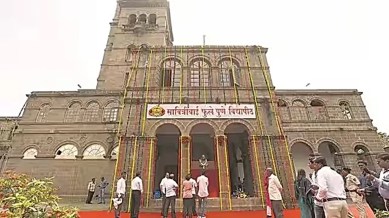Click here to join Express Pune WhatsApp channel and get a curated list of our stories
Equal Opportunity, ST/SC cells at many Pune colleges receive nil complaint on discrimination
Among the data collected by the The Indian Express, the lone higher education institute that reportedly received complaints was Pune’s Savitribai Phule Pune University (SPPU).

Several colleges and other higher education institutes in Pune city have not received any complaints pertaining to caste and gender-based discrimination at their Equal Opportunity Cells and SC/ST cells, according to data collected by The Indian Express.
The cells have been set up as per a 2012 norm of the University Grants Commission (UGC) to ensure effective and transparent redressal of grievances of the disadvantaged groups. The UGC, through a notice issued on January 10 this year, requested all higher education institutes in the country to set up Equal Opportunity Cells and SC/ST Cells.
monthly limit of free stories.
with an Express account.
Savitribai Phule Pune University, affiliated colleges
Among the data collected by the The Indian Express, the lone higher education institute that reportedly received complaints was Pune’s Savitribai Phule Pune University (SPPU). It had established a committee to look into caste-based discrimination complaints by students and staff in 2021. According to Dr Parag Kalkar, Pro-Vice Chancellor of SPPU and current chairman of the committee, the committee had received three to four complaints from teaching and non-teaching staff in the last two years, all of which had been resolved. However, it received no complaints from students, Kalkar said.
SPPU-affiliated Modern College of Arts, Commerce, and Science where an Equal Opportunity Cell has been functioning since 2018-19 has so far recorded no formal complaint, said Dr Sanjay Kharat, cell chairman.
Same is the case with SPPU-affiliated Fergusson College, where the Equal Opportunity Cell was established five years ago. Prof Prakash Pawar, head of the cell at the college, said it conducts various activities to promote equality. The college also has a separate student grievance redressal committee, he said.
Bharati Vidyapeeth’s College of Engineering affiliated to the SPPU, is also yet to record any complaint in the last two years, said Dr R N Patil, head of the ST/SC Cell.
Other universities
Data also shows that College of Engineering Pune (COEP) Technological University, Maharashtra Institute of Technology World Peace University’s Kothrud campus, and Ajeenkya DY Patil University are yet to receive any complaints on discrimination despite having grievance redressal cells.
However, authorities at Vishwakarma University, Symbiosis International University and Flame University failed to share details when contacted by The Indian Express.
What are Equal Opportunity Cells and SC/ST Cells?
Equal Opportunity Cells were introduced in the UGC (Promotion of Equity in Higher Educational Institutions) Regulations, 2012 as a way to fight caste discrimination on university and college campuses.
In January this year, while hearing a Public Interest Litigation filed by mothers of Rohit Vemula and Payal Tadvi, the Supreme Court asked the UGC to submit data regarding the setting up of Equal Opportunity Cells in universities and on the number of complaints received.
As a result, the UGC issued a notice on January 10 that said “all HEIs are requested to establish an Equal Opportunity Cell and SC/ST Cell to ensure the effective and transparent redressal of grievances of the disadvantaged groups.” The notice also requested higher education institutes to provide information about the cells and the complaints received to the UGC by January 20.
Experts raise concern over lack of complaints
On the lack of complaints received by the cell, former UGC chairman Dr Sukhdeo Thorat said that the question arises whether the the universities and students are aware about the 2012 regulations and also on the need for implementing the regulations. “Since they are not even aware of the regulation, the students don’t know whether to complain or not. The universities and the students both are unaware, they only know the Atrocities Act,” Thorat pointed out.
Rahul Sasane, president of the University Student Struggle Action Committee at SPPU, has called for more awareness on the mechanism. “The SPPU SC/ST Committee is visible on the website, but there needs to be more awareness about it. Only students, professors, and non-teaching staff are aware of this committee. Can they complain against injustice done to them. Secondly, most of the members of the committee displayed on the website are upper caste. How can all these people provide justice in a proper manner?” he pointed out.
Dr Sanjay Dabhade, member of the Tribal Doctors Forum, said that zero complaints mean that the existence of these cells is not known to students or teachers. “It is also important to see the composition of the committees — if the members are from upper caste or from the Schedules Castes and Scheduled Tribes. The structure and functioning of the higher education institutes is also important; if it is not democratic and if the management forces their decisions, then no one will dare to complain,” Dabhade said.
Click here to join Express Pune WhatsApp channel and get a curated list of our stories